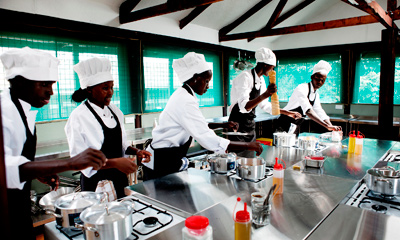 Real Africa is very proud to be financially supporting the Karen Blixen Hospitality School based at one of our favourite safari destinations in Kenya, the Karen Blixen Camp. The Hospitality School is a new venture set up last year in 2012 so that the camp can help fund local community projects in an area where youth unemployment is extremely high. Over the past few weeks we have followed the local Masai students as they learned all about the basics of kitchen hygiene, knife skills, developing their palate and their food knowledge.
Real Africa is very proud to be financially supporting the Karen Blixen Hospitality School based at one of our favourite safari destinations in Kenya, the Karen Blixen Camp. The Hospitality School is a new venture set up last year in 2012 so that the camp can help fund local community projects in an area where youth unemployment is extremely high. Over the past few weeks we have followed the local Masai students as they learned all about the basics of kitchen hygiene, knife skills, developing their palate and their food knowledge.
Week 3 – Learning to cook basic vegetable and fruit dishes
This week the students are finally moving on to cooking! Rune’s lessons continued from last weeks seasoning and palate testing to discussing and learning all about root vegetables and how important these are in the French kitchen. The students started by to make some chips, bake different root vegetables and make mashed potatoes – all classic European favourites. The Head Chef and teacher was very impressed and said, “Their results seem to be getting better and better each week. Many of them are getting a good understanding of their work.” However as they get introduced to new ingredients and topics on a daily basis they are having to learn something completely new every day which can be tricky at first, especially as all the ingredients and dishes are so completely foreign to them and their own food experiences as a Maasai in Kenya.
Vegetables
The next day the students attended lessons on the bell-pepper and the family of chilies, courgettes and aubergines. From these ingredients they were also taught how to make a very French ratatouille. They then moved onto learning and cooking with fennel, radish and avocado. They were taught about pickling and preserving various vegetables and also about the variety of salads that can be made with these ingredients. Rune was happy to see the enthusiasm the students show for the actual cooking which they prefer to the theory lessons – much like himself!
Fruit
Midweek the topic changed from vegetables to fruit which were even more popular with the students as they all seem to have a sweet tooth! Firstly they discussed commonly found fruit from their country Kenya and how to use them in the professional kitchen. There were more tasting sessions and lessons on producing dishes with the six main fruits available to them in the safari camp including passion fruit, pineapple, apple, orange, mango, and tomato.
Ice Cream
Later the same day they continued with ice cream making. Rune taught the students all about the surprisingly big topic of ice cream. Since there is such a wide range of flavours and how to use them and to make them and keep them. An ice cream machine is not necessary for making creamy ice cream; since this can be done in hand by thickening the milk or cream with egg yolks. All the students were actually able to make a creamy ice cream by hand. Ice cream is fairly tricky but a good test as all the students enjoyed tasting their own concoctions!
Desserts
The last day of the week, Friday, was all about melons and citrus fruit. The recipe for the day was a fruit salad with two varieties of melon and orange biscuits. Rune introduced the students to some surprising dessert ingredients; feta cheese and balsamic vinegar. The students had to taste the food to really see that the cheese and balsamic work perfectly with watermelon and to learn that desserts are not limited to just sweet ingredients.
Rune had noticed by Week 3 that the students were enjoying their practical cooking lessons but starting to looked bored during the theory. He started to give them some short homework to do so they have to do a small presentation to the class on random culinary topics. He hoped this would encourage them to talk about food and to be more confident about discussing things in class. This would also make them have to read up on their subject no matter how dull they might think it! Also if they are doing the theory work they are more likely to remember it than just sitting through a lecture. Rune was very happy to note though that their practical kitchen skills ( hygiene, cleaning as you work, dish washing, knife skills, structuring their work and their weekly deep cleaning ) had improved vastly.
Posted By Ruth Bolton